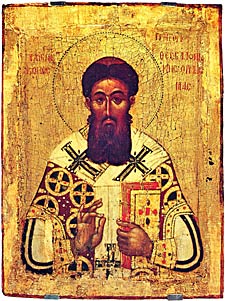This commemoration was approved at General Convention 2018, and will appear in a future edition of A Great Cloud of Witnesses.
Return to Lectionary Home Page
Webmaster: Charles Wohlers
Last updated: 20 Oct. 2018
GREGORY PALAMAS
THEOLOGIAN, 1357/59
 Gregory Palamas was born in Constantinople (?) about 1296. He became a monk of the great community at Mount Athos, near Thessalonika. Here he was one of the foremost supporters of a theory of contemplation called Hesychasm (or, after him, Palamism). The Hesychasts claimed that, by suitable spiritual disciplines, those engaged in contemplative prayer could come to see the "uncreated light" of God. Their opponents objected that this doctrine was inconsistent with the unity and the transcendence of God. At first, Hesychasm was condemned as heretical and Gregory was excommunicated. However, in 1347, thanks chiefly to the unwavering support of the monks of Athos, Gregory was brought back from exile, cleared of heretical charges, and made bishop of Thessalonika. After much controversy, his position was declared orthodox by the church of Constantinople in 1351, but by then he was worn out and an invalid. In recent years, there has been a revival of interest in his ideas.
Gregory Palamas was born in Constantinople (?) about 1296. He became a monk of the great community at Mount Athos, near Thessalonika. Here he was one of the foremost supporters of a theory of contemplation called Hesychasm (or, after him, Palamism). The Hesychasts claimed that, by suitable spiritual disciplines, those engaged in contemplative prayer could come to see the "uncreated light" of God. Their opponents objected that this doctrine was inconsistent with the unity and the transcendence of God. At first, Hesychasm was condemned as heretical and Gregory was excommunicated. However, in 1347, thanks chiefly to the unwavering support of the monks of Athos, Gregory was brought back from exile, cleared of heretical charges, and made bishop of Thessalonika. After much controversy, his position was declared orthodox by the church of Constantinople in 1351, but by then he was worn out and an invalid. In recent years, there has been a revival of interest in his ideas.
Here is how his views are described by an Eastern Orthodox writer, Timothy Ware (Bishop Kallistos of Diokleia), in his book, The Orthodox Church, pp. 77-78, published by Penguin USA. Copyright 1963,1964 by Timothy Ware.
From this, Gregory turned to the main problem: how to combine the two affirmations, that man knows God and that God is by nature unknowable. Gregory answered: we know the energies of God, but not His essence. This distinction between God's essence (ousia) and His energies goes back to the Cappadocian Fathers. "We know our God from His energies", wrote Saint Basil, "but we do not claim that we can draw near to His essence." ... But however remote from us in His essence, yet in His energies God has revealed Himself to men. These energies are not something that exists apart from God, not a gift which God confers upon men: they are God Himself in His action and revelation to the world. God exists complete and entire in each of His divine energies. The world, as Gerard Manley Hopkins said, is charged with the grandeur of God; all creation is a gigantic Burning Bush, permeated but not consumed by the ineffable and wondrous fire of God's energies.It is through these energies that God enters into a direct and immediate relationship with mankind. In relation to man, the divine energy is in fact nothing else than the grace of God; grace is not just a "gift" of God, not just an object which God bestows on men, but a direct manifestation of the living God Himself, a personal confrontation between creature and Creator. "Grace signifies all the abundance of the divine nature, in so far as it is communicated to men." [V. Lossky, The Mystical Theology of The Eastern Church, p 162] When we say that the saints have been transformed... by the grace of God, what we mean is that they have a direct experience of God Himself. They know God--that is to say, God in His energies, not in His essence.